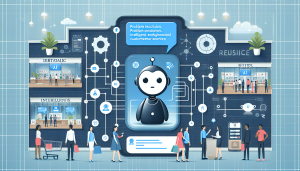 UseCasesFor.ai
UseCasesFor.ai
Choose Topic
 UseCasesFor.ai
UseCasesFor.ai
AI Use Cases
A collection of over 250 uses for artificial intelligence
A continually updated list exploring how different types of AI are used across various industries and AI disciplines,including generative AI use cases, banking AI use cases, AI use cases in healthcare, AI use cases in government, AI use cases in insurance, and more

Sign up
to receive a PDF containing all the use cases and stay updated with the latest AI trends and news (you can always unsubscribe)
Customer service chatbots

Introduction
The focus of this paper is on the application of technology in the retail industry with an emphasis on how it improves customer experience and sales. The most significant technological advancement currently being implemented is Natural Language Processing (NLP) AI especially in the customer service chatbots in the retail sector. These chatbots act as the virtual representatives to guide the customers on the website, solve their queries and complete the purchases. Customer service chatbots that incorporate NLP AI are revolutionizing the retail sector by offering customized, swift, and constant services to the customers, all without having to rely on humans.
Challenges
There are however some challenges that can be seen when trying to integrate NLP AI in customer service chatbots. Some of them are challenges that are associated with the ability of the system to correctly interpret customer requests, particularly in cases where the requests are lengthy or may be phrased in a confusing manner. Furthermore, it is challenging to train AI models that can effectively grasp casual language, short forms, and multiple dialects. There are issues to the privacy as the chatbots get customer information to enhance interaction with them. Last but not the least, integrating AI chatbots in the business may be costly and time consuming in the initial stages, which may be a deterrent for small retailers.
AI Solutions
There are a number of AI solutions being created to deal with these problems. For example, the NLP technology can be enhanced to enable the chatbots to grasp context, thus providing appropriate responses to the user’s queries. Some of the machine learning models have been designed to understand language and even phrases that are commonly used. To this end, there is the development of AI models that can blur customer data and thus adhere to privacy policies. In addition, there is the AI as a service providers who are providing AI chatbots for small retailers at a cheap and manageable cost. Some of the companies include IBM with Watson, Google’s Dialogflow, and Microsoft’s Bot Framework.
Benefits
There are numerous advantages of applying NLP AI in customer service chatbots especially in the retail sector. The advantages are as follows: enhanced customer relations through availability, the capacity to attend to several customers at once, and fast service. They can also able to make recommendations targeted towards the customer based on the data the company has on them which in turn increases sales. Furthermore, they can also assist in minimizing costs by performing routine tasks, thus allowing human agents to attend to the difficult questions. Lastly, they give an analytical overview of the customer, which may be useful for the business.
Return on Investment
The ROI of NLP AI in customer service chatbots can be quite impressive. According to a report by Juniper Research, it is possible for chatbots to lower expenses by 30% as a result of the reduction in the number of customer service agents, for example. In addition, an analysis by Accenture revealed that AI has the potential of enhancing profitability in the retail industry by 59% by 2035, mainly through increased sales from personalised recommendations and enhanced customer service. However, the ROI would vary with the investment made during the initial stages, the volume of business and the efficiency of the AI model implemented.